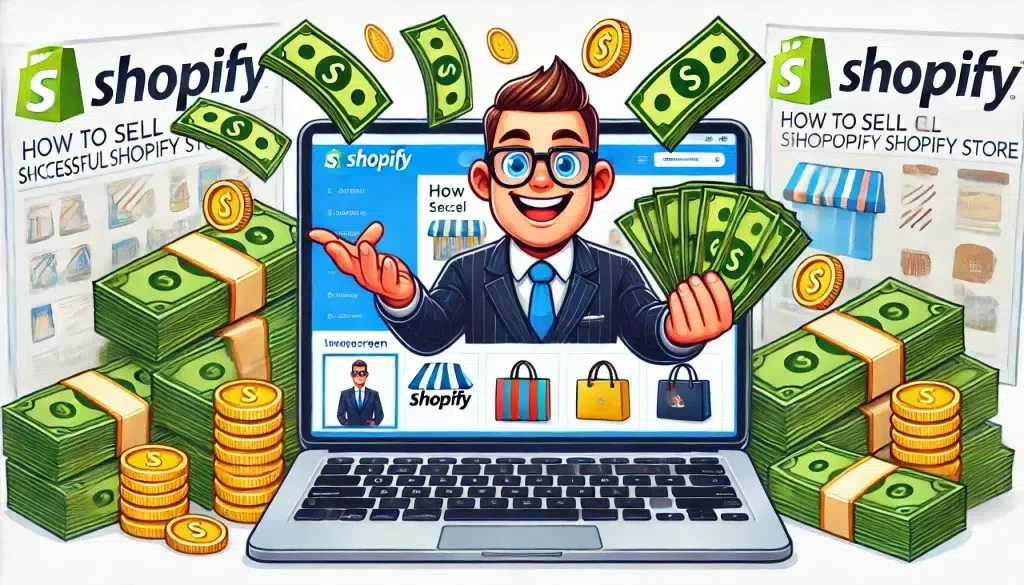
To sell a Shopify store, start by preparing your financial documents and analytics to showcase the store’s performance. Determine the store’s value using industry benchmarks, and choose a selling platform like Flippa, Empire Flippers, or Shopify Exchange. Create a compelling listing, engage with potential buyers, and negotiate terms carefully. Finalize the sale with a legal contract and provide support during the ownership transition. This approach ensures a smooth and profitable sale.
Selling a successful Shopify store can be a rewarding process, but it requires careful planning and execution.
Whether you’re looking to cash out and start a new venture or simply move on to something new, the key to a successful sale lies in your preparation and understanding of the market.
1. Prepare Your Store for Sale
- Financial Documentation: Ensure all your financial statements are up-to-date. Potential buyers will want to see your profit and loss statements, cash flow, and balance sheets.
- Website Analytics: Provide comprehensive data on traffic, conversion rates, and customer demographics. This gives potential buyers insight into the store’s performance and growth potential.
- Legal Aspects: Make sure your business is compliant with all relevant laws, and have all legal documents (like trademarks, business licenses, and supplier agreements) ready.
2. Determine Your Store’s Value
- Valuation Metrics: Your store’s value will depend on factors like monthly revenue, profit margins, and growth potential. Typically, e-commerce businesses are valued at a multiple of their net profit.
- Market Research: Look at similar businesses in your niche to gauge a fair market value.
3. Choose the Right Selling Platform
- Flippa: Ideal for smaller stores or those just starting out. It’s a marketplace that connects buyers and sellers of digital assets.
- Empire Flippers: Specializes in selling established online businesses, making it a great option for larger, more profitable Shopify stores.
- Shopify Exchange: A marketplace directly integrated with Shopify, allowing you to list your store for sale to an audience specifically interested in purchasing Shopify businesses.
4. Market Your Store
- Professional Listing: Create a detailed and compelling listing that highlights the strengths of your business, including its history, performance, and potential.
- Engage with Potential Buyers: Be transparent and responsive to inquiries. Building trust with potential buyers can lead to a smoother transaction.
5. Negotiate the Sale
- Due Diligence: Allow the buyer to conduct due diligence, providing them with the necessary access to verify all claims made in your listing.
- Negotiation: Be prepared to negotiate on price and terms. Understand what is most important to you—whether it’s an upfront payment, an earnout, or retaining a minority stake.
6. Close the Deal
- Contract of Sale: Work with a lawyer to draft a sale contract that outlines the terms of the sale, including payment structure, transition period, and any non-compete clauses.
- Transfer Ownership: This includes transferring the domain name, social media accounts, and any other assets associated with the store.
- Support the Transition: Offering post-sale support can make the transition smoother for the buyer and ensure they are set up for continued success.
FAQs about Selling a Shopify Store
Q: How long does it take to sell a Shopify store?
A: The timeline can vary widely depending on the store’s size and niche. It could take anywhere from a few weeks to several months.
Q: How do I determine the right price for my Shopify store?
A: The price is typically determined by a multiple of the store’s monthly or annual profit, adjusted for factors like growth potential, traffic, and market conditions.
Q: What legal considerations should I keep in mind?
A: Ensure all your contracts, trademarks, and business licenses are in order. Consulting with a lawyer can help you navigate the legal aspects of selling your business.
Q: Should I sell my store privately or through a broker?
A: Selling privately might save on fees, but using a broker can provide access to a larger pool of buyers and professional assistance with the sale process.
Q: Can I sell my Shopify store if I’m using dropshipping?
A: Yes, dropshipping stores can be sold, but make sure you have solid supplier relationships and clear processes that you can transfer to the new owner.
Useful Links
- Flippa – Marketplace for buying and selling online businesses.
- Empire Flippers – A broker that specializes in selling established online businesses.
- Shopify Exchange – Shopify’s own marketplace for buying and selling Shopify stores.
By following these steps, you can ensure a smooth and profitable sale of your Shopify store, setting both you and the buyer up for success in the next chapter of your business journey.




